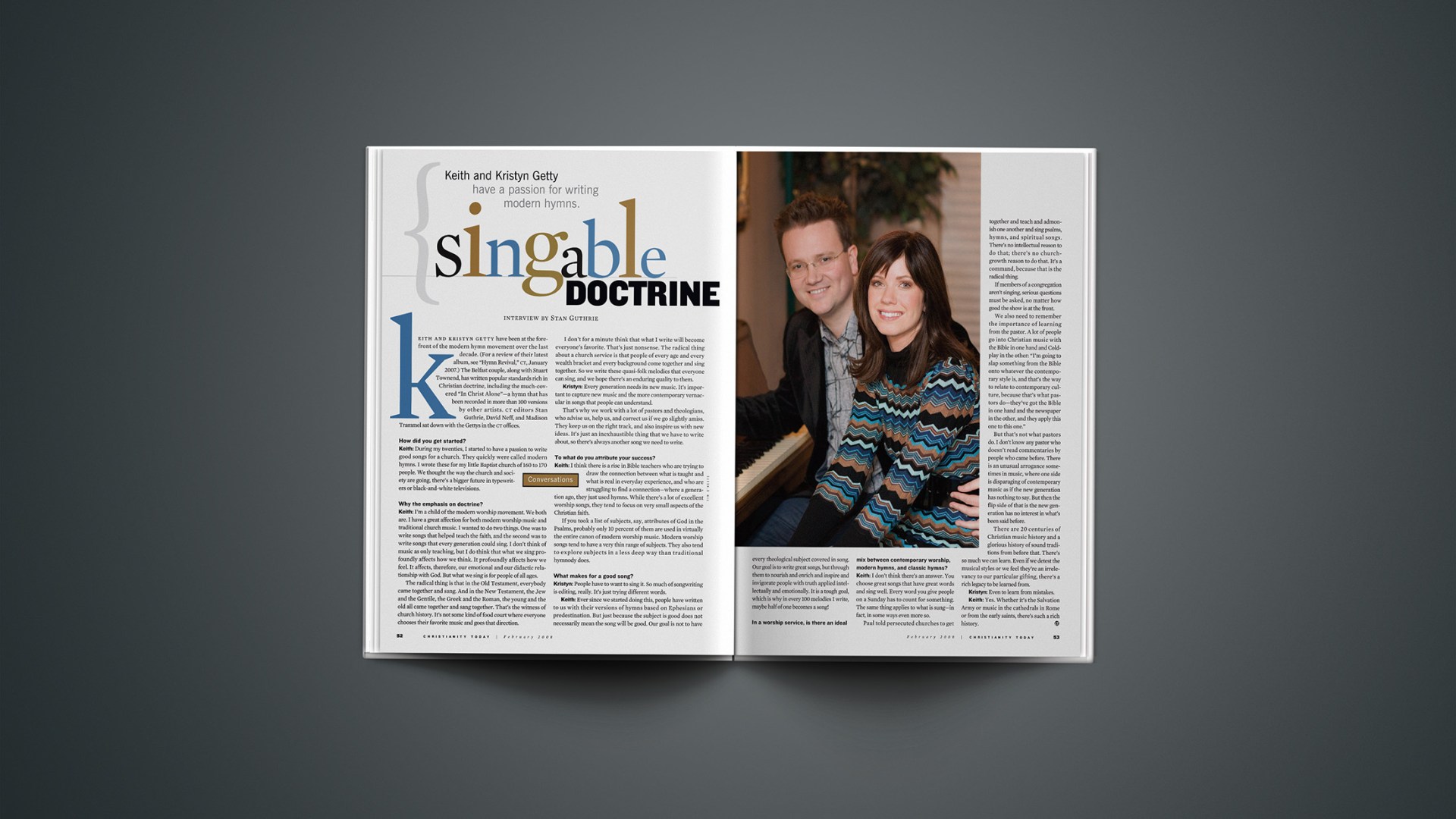Keith and Kristyn Getty have been at the forefront of the modern hymn movement over the last decade. (For a review of their latest album, see “Hymn Revival,” CT, January 2007.) The Belfast couple, along with Stuart Townend, has written popular standards rich in Christian doctrine, including the much-covered “In Christ Alone”—a hymn that has been recorded in more than 100 versions by other artists. ct editors Stan Guthrie, David Neff, and Madison Trammel sat down with the Gettys in the CT offices.
How did you get started?
Keith: During my twenties, I started to have a passion to write good songs for a church. They quickly were called modern hymns. I wrote these for my little Baptist church of 160 to 170 people. We thought the way the church and society are going, there’s a bigger future in typewriters or black-and-white televisions.
Why the emphasis on doctrine?
Keith: I’m a child of the modern worship movement. We both are. I have a great affection for both modern worship music and traditional church music. I wanted to do two things. One was to write songs that helped teach the faith, and the second was to write songs that every generation could sing. I don’t think of music as only teaching, but I do think that what we sing profoundly affects how we think. It profoundly affects how we feel. It affects, therefore, our emotional and our didactic relationship with God. But what we sing is for people of all ages.
The radical thing is that in the Old Testament, everybody came together and sang. And in the New Testament, the Jew and the Gentile, the Greek and the Roman, the young and the old all came together and sang together. That’s the witness of church history. It’s not some kind of food court where everyone chooses their favorite music and goes that direction.
I don’t for a minute think that what I write will become everyone’s favorite. That’s just nonsense. The radical thing about a church service is that people of every age and every wealth bracket and every background come together and sing together. So we write these quasi-folk melodies that everyone can sing, and we hope there’s an enduring quality to them.
Kristyn: Every generation needs its new music. It’s important to capture new music and the more contemporary vernacular in songs that people can understand.
That’s why we work with a lot of pastors and theologians, who advise us, help us, and correct us if we go slightly amiss. They keep us on the right track, and also inspire us with new ideas. It’s just an inexhaustible thing that we have to write about, so there’s always another song we need to write.
To what do you attribute your success?
Keith: I think there is a rise in Bible teachers who are trying to draw the connection between what is taught and what is real in everyday experience, and who are struggling to find a connection—where a generation ago, they just used hymns. While there’s a lot of excellent worship songs, they tend to focus on very small aspects of the Christian faith.
If you took a list of subjects, say, attributes of God in the Psalms, probably only 10 percent of them are used in virtually the entire canon of modern worship music. Modern worship songs tend to have a very thin range of subjects. They also tend to explore subjects in a less deep way than traditional hymnody does.
What makes for a good song?
Kristyn: People have to want to sing it. So much of songwriting is editing, really. It’s just trying different words.
Keith: Ever since we started doing this, people have written to us with their versions of hymns based on Ephesians or predestination. But just because the subject is good does not necessarily mean the song will be good. Our goal is not to have every theological subject covered in song. Our goal is to write great songs, but through them to nourish and enrich and inspire and invigorate people with truth applied intellectually and emotionally. It is a tough goal, which is why in every 100 melodies I write, maybe half of one becomes a song!
In a worship service, is there an ideal mix between contemporary worship, modern hymns, and classic hymns?
Keith: I don’t think there’s an answer. You choose great songs that have great words and sing well. Every word you give people on a Sunday has to count for something. The same thing applies to what is sung—in fact, in some ways even more so.
Paul told persecuted churches to get together and teach and admonish one another and sing psalms, hymns, and spiritual songs. There’s no intellectual reason to do that; there’s no church- growth reason to do that. It’s a command, because that is the radical thing.
If members of a congregation aren’t singing, serious questions must be asked, no matter how good the show is at the front.
We also need to remember the importance of learning from the pastor. A lot of people go into Christian music with the Bible in one hand and Coldplay in the other: “I’m going to slap something from the Bible onto whatever the contemporary style is, and that’s the way to relate to contemporary culture, because that’s what pastors do—they’ve got the Bible in one hand and the newspaper in the other, and they apply this one to this one.”
But that’s not what pastors do. I don’t know any pastor who doesn’t read commentaries by people who came before. There is an unusual arrogance sometimes in music, where one side is disparaging of contemporary music as if the new generation has nothing to say. But then the flip side of that is the new generation has no interest in what’s been said before.
There are 20 centuries of Christian music history and a glorious history of sound traditions from before that. There’s so much we can learn. Even if we detest the musical styles or we feel they’re an irrelevancy to our particular gifting, there’s a rich legacy to be learned from.
Kristyn: Even to learn from mistakes.
Keith: Yes. Whether it’s the Salvation Army or music in the cathedrals in Rome or from the early saints, there’s such a rich history.
Copyright © 2008 Christianity Today. Click for reprint information.
Related elsewhere:
Russ Breimeier reviewed their most recent album, In Christ Alone.
The Gettys’ website has lyrics and short samples from the album.










